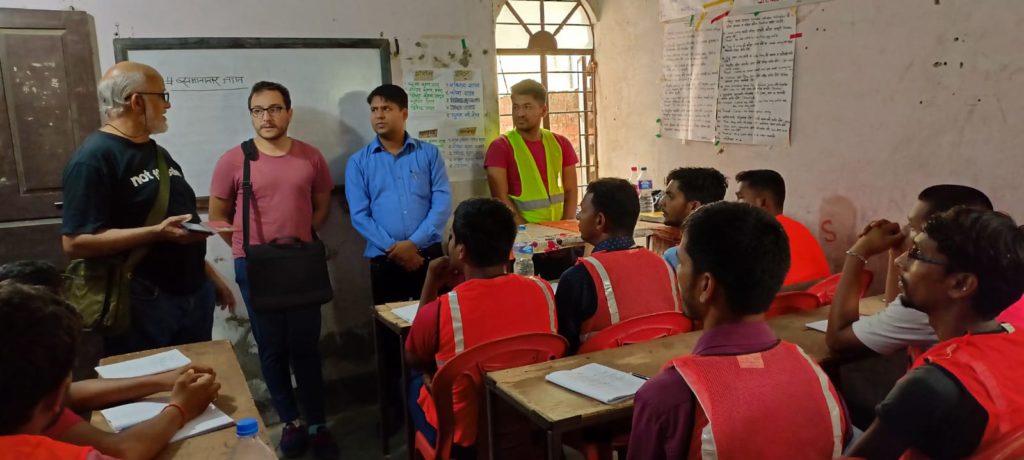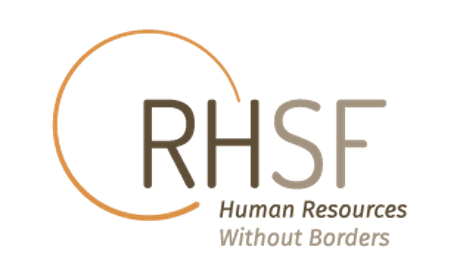Migrant workers: RHSF investigates on the field in Nepal
Published on Oct 27, 2022
By GUY CLAVEL
With the World Cup in Qatar just weeks away, the spotlight is once again on the plight of migrant workers in the UAE, many of whom are from Nepal.
Ressources Humaines Sans Frontières (RHSF) visited Kathmandu as part of one of its projects to analyse the measures taken by Nepal to protect its nationals going to work abroad.
A dive, on the ground, in a theoretically perfect system. Deviated in practice.
Nepal : significant emigration
A shock: since Qatar was awarded the FIFA World Cup 2022 in 2010, more than 6,500 workers from five South Asian countries, including Nepal, have died, the British daily The Guardian recently reported from a compilation of government sources. To which must be added deaths among other nationalities such as Filipinos, Kenyans…

For the Nepalese, the paper said, the death toll was 1,641, 48% of which were officially classified by the Qatari as “natural causes”.
According to official statistics from Nepal’s Department of Foreign Employment (DoFE), the Himalayan country of some 29 million people has seen more than 4 million workers leave for the 110 countries approved by the government in Kathmandu since 2008.
The DoFE further detailed that Malaysia was in 2021 – 2022 one of the major destinations of these Nepalese migrant workers (6%), after notably Qatar (29%), the United Arab Emirates (UAE) (20%), or Saudi Arabia (30%).
RHSF, as part of a field experimentation project co-funded by its endowment fund (RHSF Endowment Fund) and the French Development Agency (AFD), carried out a survey in Kathmandu to analyse a recruitment channel between Nepal and Malaysia, from the village of origin to the workplace.
The aim was to analyse the risks of forced labour faced by Nepali workers migrating abroad, and to tackle the overall business model of recruitment agencies by involving all stakeholders, from employers and their ordering companies.
A seemingly exemplary legislation
Nepal was one of the first countries to join the 8.7 Alliance, an inclusive global public-private partnership under the aegis of the United Nations committed to achieving target 8.7 of the 2030 Sustainable Development Goals (SDGs), specifically the eradication of child labour by 2025 and forced labour by 2030. It has even become a “pioneer country” of the Alliance. This means that it has committed itself to accelerate its efforts to achieve this goal by adopting a national strategy, developed with all relevant national and local administrations and actors, both public and private.
As a result, Kathmandu has developed specific bodies, policies and regulatory frameworks to improve the conditions for labour migration of their nationals.
Recruitment fees that can be charged to workers are now limited or even prohibited, forcing economic actors to rethink recruitment channels. For example, in 2019, the country banned the use of “sub-agents” for recruitment in remote areas.
In 2015, it had already introduced “free-visa free-ticket” legislation under which the employer must pay for the worker’s visa and airfare to 7 countries, including Malaysia.
Other costs, including agency fees, are covered by a bilateral agreement with Malaysia (2018). It obliges the employer to pay the recruitment costs (up to a certain amount), the medical examination…
The Nepalese government keeps an eye on workers wishing to migrate abroad as they must receive prior approval from the government. They can then apply individually or through recruitment agencies.
Then, during the whole hiring process, the candidates to migration are controlled by the administration. Among other things, they undergo a medical check-up, attend a two-day preparation session in a government-approved centre, receive their visa, and finally sign the employment contract, which is written in several languages.
Finally, under the bilateral agreements between Nepal and Malaysia, contracts are checked twice by the authorities in Kathmandu before the migrant workers leave.
Host country Malaysia has committed to preventing forced labour by participating in the International Labour Organization (ILO) Bridge project since 2019, which aims to strengthen laws and authorities’ capacities to prevent forced labour. Malaysia is also in the process of becoming a “pioneer country” of Alliance 8.7.
To recruit one or more workers from Nepal, the employer must make an official request, provide all the necessary documents to the Nepalese embassy in Kuala Lumpur, or directly to the Nepalese Recruitment Agency (NRA). Finally, the employer must specify a large number of elements such as the salary, the working hours, provide a copy of the contracts between the company and the future employee, between the employee and the recruitment agency…
Circumventing legislation

The vast majority of potential migrants come from remote and rural areas. In order to find work abroad, they have to go through one of the 840 or so agencies listed by the DoFE. This practice is followed by almost 90% of applicants.
An initial analysis conducted by RHSF in 2020 on the migration path of Nepalese workers to Malaysia had already shown that the complexity and opacity of the recruitment chain often led to situations of debt bondage.
The new mission, carried out in June 2022 by Aziz Ahammout (RHSF) and the Malaysian NGO Tenaganita, confirmed that applicants were still, in most cases, being cheated by the agencies and deceived about the contracts signed.
Accustomed to paying for work, and unaware of their rights, candidates to migration continue to pay large and undue fees to the agents who canvass them prior to their departure. When questioned, many said that they had paid for medical expenses and transport to Kathmandu to complete the procedures. All those contacted seemed to be aware of the “free-visa free-ticket” rule, but no one thought that the agencies really applied it. Many felt that it was a “joke”.
Finally, some agencies deceive candidates themselves or circumvent the law.
Recruiting agents, for example, tell them that the better they pay an agency, the better the job they will be offered. In other cases, applicants have to pay in advance all the preliminary expenses for the procedures (trip to Kathmandu, medical check-up…), and are not reimbursed if they are not accepted by an employer. Or again, agents ask for undue sums (transport costs, bedding, etc.), and buy the victim’s silence by threatening not to obtain a visa.
Faced with all the costs incurred even before their departure due to a lack of knowledge of the legislation, or due to deception on the part of the agencies, migrant workers often get into debt and borrow from loan sharks who charge very high interest rates.
Upon arrival in Malaysia, they may again face situations that are still similar to forced labour.
Often, according to testimonies received during the RHSF investigation, contracts are changed at this point, written in Malay or English, with different jobs and salaries than expected. The Nepalese cannot go back and are forced to accept them.
Furthermore, migrant workers are frequently subjected to abuses by employers that are also considered to be forced labour: confiscation of passports, illegal deductions, excessive working hours, undignified housing conditions, etc. Or their rights to trade union representation and social dialogue, which are limited in Malaysian law, are not accessible to them in practice.
Objective: fair recruitment channels in Nepal

Despite the official goodwill shown by the governments of Nepal and Malaysia, RHSF’s analysis shows the extent of the obstacles to a real fight against forced labour.
These include a lack of enforcement and monitoring of whether workers have paid any fees, a lack of employers willing to actually pay them, sub-agents recruiting in remote areas, etc.
The recruitment channels are in any case at the heart of the problem.
The project led by Aziz Ahammout for RHSF directly addresses this issue: it aims to establish a recruiting channel based on a sustainable economic model for all stakeholders along the value chain, taking into account their respective legitimate interests. In short, it is about finding ways to manage human resources in a responsible way that reduces the risk of abusive labour without compromising or even better improving productivity and quality, and to build fair recruitment channels.
The project was launched by RHSF’s action research programme, “Lab 8.7”, with the support of the French Ministry of Europe and Foreign Affairs (MEAE) and committed companies ready to invent, test and disseminate business practices capable of contributing to the eradication of child labour and forced labour
The field experience of RHSF, which has been analysing and preventing this type of risk for 15 years, has shown that the fight against forced labour can only be carried out through a global and transversal approach, involving politicians, companies, trade unions, social actors, etc. And that it should be supported by local NGOs such as Tenaganita, which has been working for more than 40 years in Malaysia for decent work, particularly with migrant women.
For RHSF, isolated actions lead to circumvention strategies on the part of actors – such as the use of “informal fees” for recruitment in Asia. Any solution must therefore ensure the acceptability of the actions carried out by the actors themselves to ensure success and sustainability.
Migrants have always been vulnerable to the complexity of recruitment chains and the multiplication of actors in these systems.
The unacceptable human cost of hosting the World Cup in Qatar has highlighted the situation of tens of thousands of foreign workers engaged in the construction of infrastructures in Doha. Situations that are observed to one degree or another in many countries in this geographical area, or elsewhere.
For RHSF, only actions from the field, experimenting with new concrete and pragmatic business practices, could prevent the tragedies that are unfolding before our eyes for the World Cup, or still hidden in companies.
These actions, discussed and implemented with all actors, from governments to the last links in the recruitment chain, must be undertaken in the workers’ country of origin as well as in the country of destination… and even in the countries where the ordering companies are located.
These actions are urgently needed to improve the plight of migrant workers around the world now, and to avoid another human catastrophe when building the infrastructure for the Asian Winter Games in Saudi Arabia in 2029.



